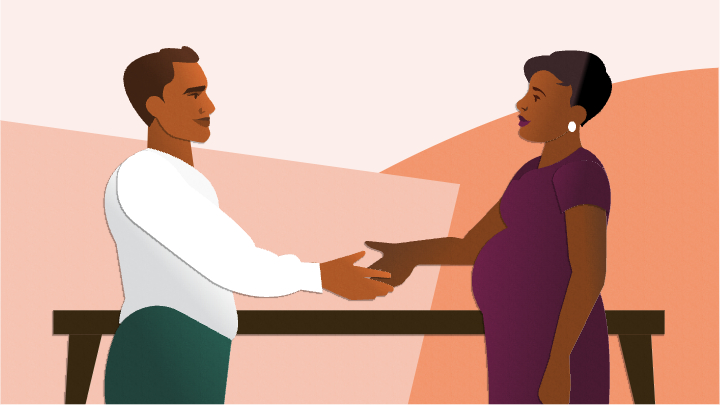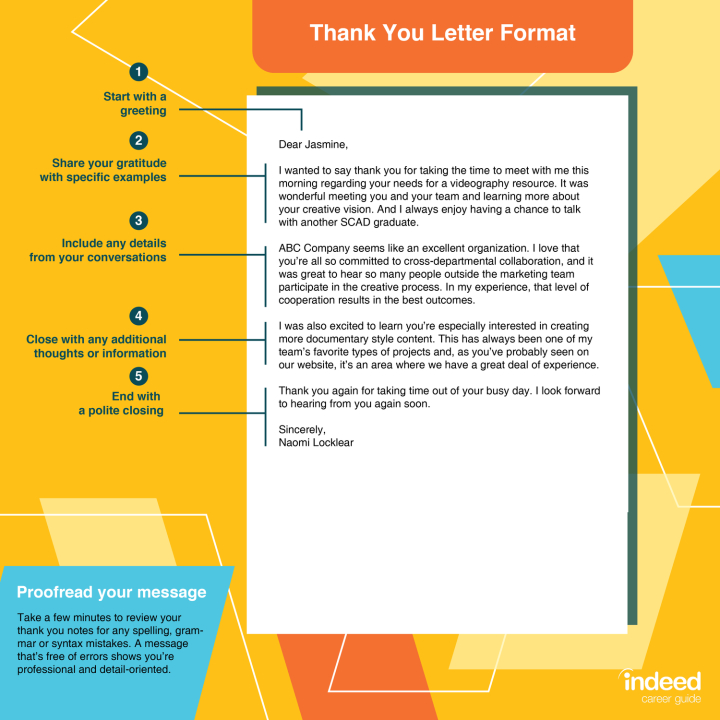How To Thank Someone for an Interview (With 10 Email Tips)
Updated March 10, 2023

Why you should thank someone for an interview
Thanking someone for taking the time to give you an interview is considered professional etiquette. It displays appreciation that they considered you for the position, an eagerness to receive an offer and provides an excellent opportunity to build off of the relationship that you established in the interview.Aside from being polite, thanking your interviewer also provides you with another opportunity to express your interest in the position. You can seize the chance to clarify any details you think you may have missed and reinforce that you're the perfect fit for the position.Related: Guide to Thank You Notes
Image description
"Thank You Letter Format" is the title of this infographic that shows an image of an example letter.On the left side of the infographic, a numbered list points to each section of the email:
- Start with a greeting.
- Share your gratitude with specific examples.
- Include any details from your conversations.
- Close with any additional thoughts or information.
- End with a polite closing.
How to write a thank you note after an interview
Follow these steps to write an effective thank you reply after an interview:1. Decide between email or paper
Most businesses will accept an emailed thank you, but be aware of the company and its values. For example, more traditional organizations may prefer a handwritten thank you note. Though usually unnecessary, most of the time a paper note will seem more personal, and it will likely set you apart from other candidates. The mail service could delay your note, so consider dropping it off in person to ensure it gets there promptly.If you're unsure, you can always send both an email and a paper thank you note. In this case, send the email as soon as you get home from the interview, then mail the formal letter as soon as you can after that.2. Use catchy subject lines
If you're sending an email thank you note, avoid using common subject lines that may end up in the spam folder. Ensure that you use an email heading that presents your email as unique and prompts the interviewer to read your email. Examples of great subject lines include: "Thank you for the opportunity," "Follow up regarding the interview today," or "Great interviewing with you today."3. Address the note correctly
When addressing your interviewer, be sure to use the correct name, spelling and prefix. You'll want to avoid any mistakes, so double-check that the email address is correct as well. Even if you're on a first-name basis with the interviewer, it's important to display elevated professionalism in the thank you note. Using "Dear Mr./Ms. [last name]" is always a safe bet when addressing them.4. Think of it as more than a thank you
Even more than polite and proper etiquette, this is a chance for you to reiterate your personal selling points. A successful note will express gratitude as well as continue the conversation from the interview. Include your qualifications for the position, and use the opportunity to address anything that you felt you might have missed during the interview.Related: 21 Job Interview Tips: How To Make a Great Impression5. Personalize it
Customize your thank you note with specific details from the interview. This will show the interviewer that you were paying attention, and it will also allow you to build off of the relationship that you've begun establishing with them.6. Send a unique note to each interviewer
In instances where there are multiple interviewers, write an individualized note to everyone that spoke with you. Assume that your notes will be shared among the interviewers, so make sure not to repeat any content. Crafting unique notes for each recipient can show them that you value them and their contribution.7. Proofread it before sending
Make sure to double-check your thank you note and then check it again. Read the note aloud, and consider having someone else read over it before sending it. Make sure the name, email address and position are all properly spelled, and test any links you've provided.8. Send it immediately
To ensure your interview is still fresh in their mind, send the thank you note within 24 hours. Also, send an email within working hours to reduce the request of the interviewer missing your message.9. Be mindful of your tone
While drafting a note or email, it's important that you're mindful of its tone. While smaller organizations might require a semi-formal or informal tone, bigger organizations or professional services firms require formal tones. When in doubt, it's best to use a formal tone in your message.10. Exercise patience
After sending the thank you note or email, ensure that you wait a while before sending a follow-up message. Ideally, it's advisable to wait two weeks before sending another email or note. Alternatively, you can wait for the period indicated by the interviewer. After this period, which may be less than the conventional two weeks, you can send your follow-up email.Template for thanking someone for an interview
Here is a template or guideline to use when writing a thank you note after an interview:[Subject](if you're sending an email)[Greeting][Begin your letter or email with a paragraph thanking your interviewer for taking the time to talk to you.][For the next one to two paragraphs, personalize the note with any specific details from the interview that will demonstrate your engagement. This could also aid in their recollection of you and your conversation. Additionally, take this time to reiterate your qualifications for the job and clarify anything that you felt you missed in the interview.][In your conclusion, thank the interviewer one last time, and mention your interest in the job. Letting them know that you expect to hear back from them soon is a subtle and confident way to close the note. Even if they decide to go in a different direction, this line could ensure that they at least reach out to you to let you know.][Using "Sincerely" or "Best regards" are simple and effective ways to sign off.][Your first and last name]
[Your email address]
[Your phone number]
[Pertinent links, such as online portfolios or profiles]Download Email Template
To upload the template into Google Docs, go to File > Open > and select the correct downloaded file.
Examples of how to thank someone for an interview
Here are two examples of effective post-interview thank you notes sent by email:Example 1
"SUBJECT: Senior Project Manager Position—Thank You for MeetingDear Ms. Miyazaki,Thank you for taking the time to meet with me yesterday to discuss the senior project manager position. It was great learning more about the company and culture at Express Merchandise Design. It sounds like collaboration is an important part of your company culture. I find this so refreshing, as it's something I value as well.I left the interview feeling even more excited and intrigued by the position and what I could bring to it. I feel that my experience implementing successful project launches, adhering to strict deadlines and streamlining project processes will make me a valuable member of the team.Please feel free to reach out if you need any more information from me. Thank you again for your time and consideration. I look forward to hearing back from you and continuing our discussion about the role.Sincerely,Clarence Dove
clarence.dove@email.com
555-652-1010
cdovedesign.net"
Example 2
"SUBJECT: Thank You for the Social Media Manager InterviewDear Mr. Salazar,I wanted to thank you for discussing the social media manager position at Acme Advertising this morning. I enjoyed meeting you and some of the team members, and it was great learning more about your plans for the future. Between the site updates and expansion of the target audience, it seems like this will be an exciting year full of growth.I would love to utilize my marketing abilities and experience working at agencies to help the team navigate through this critical time of development by building a social media presence and a strong customer base. I'm very excited about what we could accomplish together.I look forward to continuing our discussion on how I can help you and your team reach your goals.Sincerely,Henry Hensley
henry.hensley@email.com
555-505-0055
henryhensley.com"Related: Follow-Up Email Examples for After the Interview
Do you need help with your resume?
What to avoid when thanking someone for an interview
It's difficult to go wrong when writing a thank you note, but some things could completely discount the sentiment. Here are a few things you should avoid when writing a post-interview thank you:Sending an email at an odd time
Though it may seem inconsequential, an email received at 1 a.m. could leave the wrong impression. The best practice is to send the email the same day or first thing the next morning.Waiting more than 24 hours after the interview
It's important to thank your interviewer as soon as possible after your meeting, and definitely within 24 hours of the interview. Waiting too long could give them the impression that you're uninterested in the position.Assuming someone's preferred prefix
Look for clues throughout the interview and in your email correspondence to find out how your interviewer would like to be addressed before guessing. Additionally, it will likely be a safer choice to use "Ms." instead of "Mrs." when addressing a note to a female interviewer.Misspelling their name
Something as simple as misspelling your interviewer's name could give them the impression that you don't value them as a person. It will also display an inattention to detail, which could cost you the job.Writing it ahead of time
Though it is important to send the thank you note immediately after the interview, doing so too quickly can seem disingenuous. Take the opportunity to carefully craft a personal note that includes details from the interview.Using the same message for email and paper
If you decide to utilize both mail and email, make sure to write a unique message for each.Related: How To End an Email (with Examples)This video will be your guide on taking that next step to follow up after an interview while avoiding worrying or second guessing!
Explore more articles
- How To Become a Product Tester at Home (With Tips)
- 15 Top Psychology Degree Jobs
- 15 Sitting-Down Jobs To Consider (Plus Salaries and Duties)
- 40 Best Online Jobs (Salaries, Duties and Where To Find)
- What Is a Public Information Officer? (With Job Duties and Skills)
- A Day in the Life of a Journalist (With Duties and FAQs)
- The Pros and Cons of a 60-Hour Workweek
- 20 of the Best Cities for Tech Jobs in 2024
- How To Become a Large Animal Vet and How Much They Make
- What Is a Process Server? (Plus Why They're Important)
- How To Get a Job After Being Fired for Poor Performance
- How To Become a Freelance Video Editor in 2024 (With Tips)